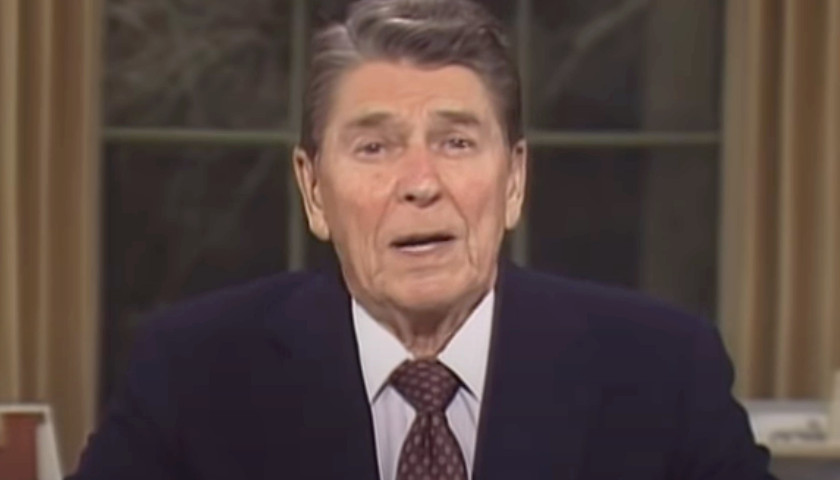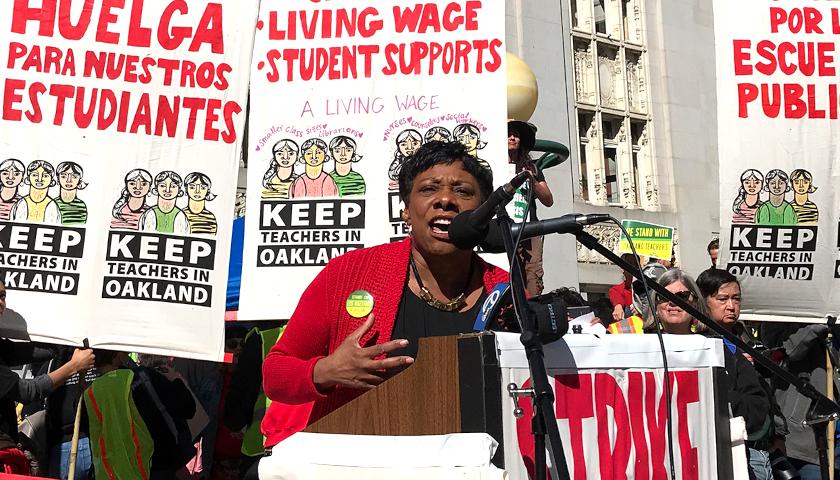by Barry Brownstein
In his 1989 farewell address, President Reagan asked the rhetorical question, “Are we doing a good enough job teaching our children what America is and what she represents in the long history of the world?”
He followed up with the answer:
Our spirit is back, but we haven’t reinstitutionalized it. We’ve got to do a better job of getting across that America is freedom – freedom of speech, freedom of religion, freedom of enterprise – and freedom is special and rare. It’s fragile; it needs protection.
Rather than reinstitutionalizing the teaching of what freedom means, it seems fair to say that we have deinstitutionalized the principles of freedom. Socialist ideas dominate education and the media.
Later in his address, Reagan issued a prophetic warning: “I am warning of an eradication… of the American memory that could result, ultimately, in an erosion of the American spirit.”
Today liberty is contracting. Rather than being alarmed, people are cheering. The socialist 1619 curricula are being adopted in classrooms all over America.
In other schools, “intersectionality” theory is taught to embed the idea that “human history is largely reduced to white Christian men being the ‘oppressors,’ and everybody else being ‘intersected’ by one or more layers of this ‘oppression’.”
In June, the taxpayer-funded Smithsonian Institution released teaching material suggesting “that the nuclear family, science, capitalism, and the Judeo-Christian tradition are forms of oppressive ‘whiteness’ that non-white people should reject as part of an oppressive system.”
Teaching hatred to fight hatred is not the education Reagan had in mind when he said, “We’ve got to teach history based not on what’s in fashion but what’s important.”
What’s important? Start with an understanding of the American Revolution, Reagan advised:
Ours was the first revolution in the history of mankind that truly reversed the course of government, and with three little words: ‘We the People.’
‘We the People’ tell the Government what to do, it doesn’t tell us. ‘We the people’ are the driver – the Government is the car. And we decide where it should go, and by what route, and how fast. Almost all the world’s constitutions are documents in which governments tell the people what their privileges are. Our Constitution is a document in which ‘We the People’ tell the Government what it is allowed to do. ‘We the people’ are free.
Reagan was not speaking in hyperbole. The American Constitution is the only constitution which begins with the understanding that rights are inherent in each human being, and thus the government has limited powers. In James Madison’s words, “The powers delegated by the proposed Constitution to the federal government are few and defined.”
“Few and defined” powers? Today that understanding has been reversed. Many Americans believe that fundamental freedoms should be curtailed. Reagan said in his farewell address, “I hope we have once again reminded people that man is not free unless government is limited. There’s a clear cause and effect here that is as neat and predictable as a law of physics: as government expands, liberty contracts.”
Reflecting on his moniker, “The Great Communicator,” Reagan explained that principles, not his style, powered him:
I never thought it was my style or the words I used that made a difference – it was the content. I wasn’t a great communicator, but I communicated great things, and they didn’t spring full bloom from my brow, they came from the heart of a great nation – from our experience, our wisdom, and our belief in the principles that have guided us for two centuries.
Reagan reflected that Americans who believed in American values and principles propelled his success:
I’ve had my share of victories in the Congress, but what few people noticed is that I never won anything you didn’t win for me. They never saw my troops; they never saw Reagan’s Regiments, the American people. You won every battle with every call you made and letter you wrote demanding action.
If today’s politicians leave you less than enthusiastic, Reagan would explain that they merely reflect what Americans believe. Too many believe the core of America is rotten; they are ready to discard America’s principles in favor of authoritarian and socialist ideologies.
A Cuban immigrant recently warned, “Don’t lose this place [America] because you’re never gonna be as lucky as me. Because if you lose this place you have no place to go.”
Reagan understood, “As long as we remember our first principles and believe in ourselves, the future will always be ours.”
It is hard to read those words and not experience great sadness.
Too few Americans cherish America’s principles. As citizens, we no longer engage in open dialogue about the principles at the foundation of our Constitution. We no longer teach our children freedom’s history. Without taking steps to reinstitutionalize America’s principles, Reagan would warn, America’s future is bleak.
– – –
Barry Brownstein is professor emeritus of economics and leadership at the University of Baltimore. He is the author of The Inner-Work of Leadership. To receive Barry’s essays subscribe at Mindset Shifts.
Photo “Ronald Reagan Farewell Address” by Reagan Library.





